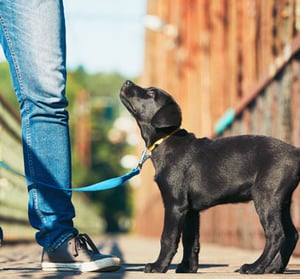How to Choose Your Overseas Pet Relocation Specialist
Updated on: August 21, 2023 | Author: Starwood Pet Travel

When it comes to moving overseas with your family, including your beloved pets is often a no-brainer. After all, they're part of the family too, right? But before you start packing their bags, there are a few things to consider. Depending on your specific pet and your destination, there may be reasons why bringing them along might not be the best idea. However, in most cases, it's not a matter of "if," but "how."
Now, you might be thinking, "I can handle this myself, right?" After all, if you're a frequent flyer, you're practically a pro at making travel arrangements and navigating airports. But here's the thing: moving a pet overseas is a whole different ballgame compared to getting the human members of your family to your destination.
The complexity of the process depends on where you're headed and how much time and energy you're willing to invest. Some countries even require that all incoming pets be transported by a commercial pet relocation company. Take Australia, for example. If you're moving there, you'll have no choice but to hire a professional.
But assuming you do have the option to do it yourself or hire a pro, there are several factors to consider before making a decision. Regardless of which route you choose, the key to a successful and stress-free experience is having a clear understanding of what needs to be done in order to relocate your pet to another country.
So, before you embark on this adventure, take some time to weigh your options and gather all the necessary information. And remember, no matter what you decide, your furry friend will be forever grateful for the effort you put into making their journey as smooth as possible.
WHAT IT TAKES TO MOVE A PET OVERSEAS
Should Your Pet Make the Move?
 While air travel for pets is generally safe, there are some factors to consider before deciding to bring your furry friend along. Certain countries have restrictions on specific dog breeds, such as pit bulls, so it's important to check these regulations beforehand. Additionally, pets with chronic health conditions or elderly pets may not be suitable for air travel, and it's best to consult with your vet to determine the safest option for them.
While air travel for pets is generally safe, there are some factors to consider before deciding to bring your furry friend along. Certain countries have restrictions on specific dog breeds, such as pit bulls, so it's important to check these regulations beforehand. Additionally, pets with chronic health conditions or elderly pets may not be suitable for air travel, and it's best to consult with your vet to determine the safest option for them.
The climate is another factor to consider, as certain breeds may not fare well in extreme weather conditions. For snub-nosed breeds, like brachycephalic dogs and cats, ground transport may be a better alternative due to their difficulty in breathing during air travel. If you're moving within the country, a road trip could be an option, but for overseas moves, air travel is necessary. Even if you're traveling by private boat or plane, your pet will still need to meet the same requirements as commercial flights.
It's crucial to start early in preparing your pet for the move, as there may be specific timeframes for completing necessary tasks. Researching and understanding the requirements of your new country is essential, as pet etiquette and regulations may differ. Lastly, if you're moving during the winter, it's important to inquire about how pet relocation companies handle winter issues, as weather conditions and temperature restrictions may affect travel plans.
Start Early
Preparing your pet for an overseas move can be a daunting task with various items that need to be completed within specific timeframes. From securing flight reservations to obtaining an IATA-compliant travel crate and official documentation like a health certificate and import permit, there are numerous requirements to meet. Each country has its own regulations for importing pets, and the more complex these requirements are, the more complicated the process becomes. Expect multiple trips to the vet for exams and immunizations, including a possible waiting period after the rabies titer test. You may also need to have your pet's health certificate endorsed by the USDA or get the import documents approved by your new country's consulate. Depending on your origin and destination, quarantine reservations may also be necessary.
It's crucial not to procrastinate when it comes to learning about these requirements. Any mistakes or incomplete paperwork could result in your pet being denied travel or sent back upon arrival. Unfortunately, finding the necessary information can be challenging, as some countries may not have it readily available on their official government websites. In such cases, you'll need to search elsewhere, keeping in mind that even information provided on official sites may not always be up to date.
To ensure that you don't overlook any important details while preparing your pet for the move, it's recommended to create a detailed checklist with a timeline and mark key dates on a calendar. Additionally, it's essential to stay calm throughout the process, as pets pick up on our emotions. Dogs are generally more adaptable to change, while cats may require a different approach due to their dislike of change. Regardless of the pet, taking steps to reduce their anxiety before the move is crucial.
Purchase a travel kennel in advance
If you're moving with a pet, purchasing an airline-approved kennel as early as possible is highly recommended. Regular carriers usually do not meet the requirements for air travel, so it's important to invest in a sturdy, escape-proof kennel that provides ample ventilation without any protruding parts. Moreover, ensuring that it is the correct size for your pet is essential. By introducing your pet to the kennel in advance and allowing them to spend time eating, playing, and resting in it, they will become more comfortable with it when it's time to travel.
Familiarize yourself with the new cultural norms
While you focus on the practical aspects of moving your pet overseas, it's also crucial to familiarize yourself with pet etiquette in your new country. Understanding cultural differences and local expectations will help you become a responsible pet parent and integrate smoothly into your new community. Researching local veterinarians, pet supply stores, playgroups, and potential boarding facilities in advance can ensure a smoother transition for both you and your pet.
WHAT TO ASK YOUR PET RELOCATION COMPANY

Although you now have a good understanding of the tasks involved in moving your pet overseas, there are still potential pitfalls and unexpected issues that may arise. While it's sometimes possible to handle everything independently, many pet owners opt to work with professional pet relocation companies due to the complexity of the process. To ensure a smooth and safe move for your pet, it's important to choose a reputable company that understands the specific challenges of pet travel and can address your concerns.
If your move is scheduled during the winter, it's crucial to inquire about how prospective pet relocation companies handle winter-related issues. Weather conditions, such as storms and snow, can cause travel delays, and the cold itself can pose hazards to pets during the transportation process. Understanding the company's policies and procedures in case of weather delays is important. Additionally, if you're moving between hemispheres, timing becomes crucial, as winter in one location may be summer in another, potentially leading to weather-related embargoes on pet travel.
To make an informed decision about the best pet relocation company for your needs, it's essential to ask the right questions. Inquire about the required documentation for pet transportation, their policies in case of travel disruptions, their ability to assist in finding an airline-approved travel crate, and whether sedation for pets is recommended. Understanding the services provided and the associated costs will help you plan accordingly.
Questions to ask:
- What documentation do I need to obtain?
- Can my pet's travels be delayed?
- What will you do if there is a weather delay?
- Can you help me find an airline-approved travel crate?
- Should I sedate my pet before they fly?
- Exactly what services do you provide?
- What will my pet’s move cost?
- How long have you been in business?
- How much experience do you have working with pets like mine?
- How much experience do you have relocating pets between my current home and my destination country?
- Do you belong to the International Pet and Animal Transportation Association? (They should be. IPATA members meet the industry’s highest standards of pet care and safety.)
- Where can I read reviews and ratings about your company? Can I speak with past clients about their experiences?
- Who will handle my pet’s travel planning? Exactly what will that entail? How will they communicate with me?
- Do you offer any kind of pet travel insurance?
- Will you keep me apprised of my pet's progress once they are in transit?
- Do you own pets yourselves?
Remember, professional pet transport specialists have the expertise and up-to-date knowledge of all the intricacies involved in moving pets overseas. They have established relationships with pet-friendly airlines and can handle details that may be challenging for pet owners to navigate independently. By working with a professional, you can have the peace of mind that every aspect of your pet's move is being handled with care and expertise.
Subscribe to the Blog
Enjoy our content? Get them sent to your inbox!
Subscribe Now!

